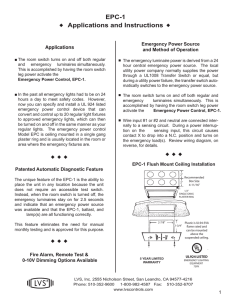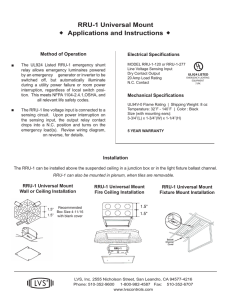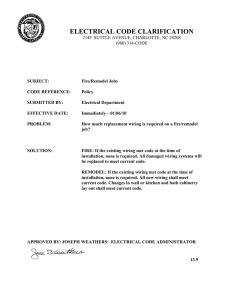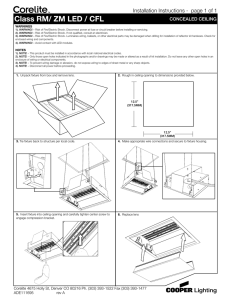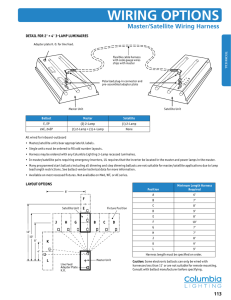EPC-A-1 p1 - Hubbell Control Solutions
advertisement
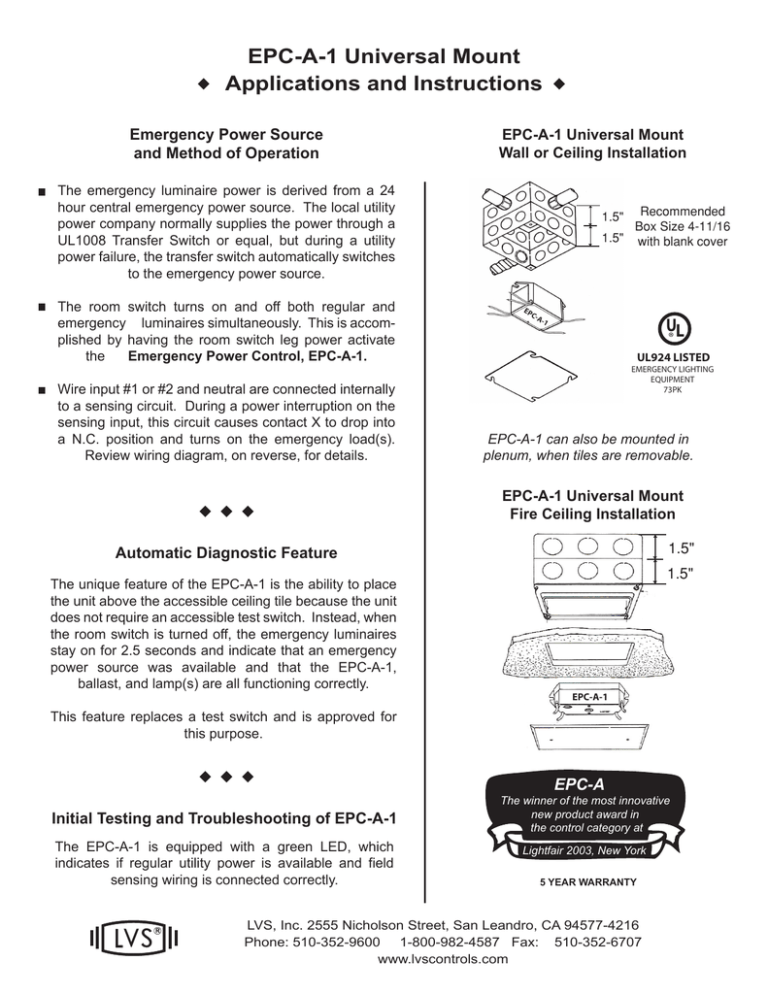
EPC-A-1 Universal Mount Applications and Instructions Emergency Power Source and Method of Operation EPC-A-1 Universal Mount Wall or Ceiling Installation The emergency luminaire power is derived from a 24 hour central emergency power source. The local utility power company normally supplies the power through a UL1008 Transfer Switch or equal, but during a utility power failure, the transfer switch automatically switches to the emergency power source. The room switch turns on and off both regular and emergency luminaires simultaneously. This is accomplished by having the room switch leg power activate the Emergency Power Control, EPC-A-1. Wire input #1 or #2 and neutral are connected internally to a sensing circuit. During a power interruption on the sensing input, this circuit causes contact X to drop into a N.C. position and turns on the emergency load(s). Review wiring diagram, on reverse, for details. EP C-A UL ® -1 UL924 LISTED EMERGENCY LIGHTING EQUIPMENT 73PK EPC-A-1 can also be mounted in plenum, when tiles are removable. EPC-A-1 Universal Mount Fire Ceiling Installation Automatic Diagnostic Feature The unique feature of the EPC-A-1 is the ability to place the unit above the accessible ceiling tile because the unit does not require an accessible test switch. Instead, when the room switch is turned off, the emergency luminaires stay on for 2.5 seconds and indicate that an emergency power source was available and that the EPC-A-1, ballast, and lamp(s) are all functioning correctly. EPC-A-1 This feature replaces a test switch and is approved for this purpose. EPC-A Initial Testing and Troubleshooting of EPC-A-1 The EPC-A-1 is equipped with a green LED, which indicates if regular utility power is available and field sensing wiring is connected correctly. The winner of the most innovative new product award in the control category at Lightfair 2003, New York 5 YEAR WARRANTY LVS, Inc. 2555 Nicholson Street, San Leandro, CA 94577-4216 Phone: 510-352-9600 1-800-982-4587 Fax: 510-352-6707 www.lvscontrols.com Model EPC-A-1 Installation Instructions UL ® LISTED EMERGENCY LIGHTING EQUIPMENT 73PK It is recommended to number field wiring Installation In order to install the EPC-A-1 in accordance with national/local code requirements, a qualified electrician should review and understand the installation instructions: Check voltage and current requirements. Verify and lock out circuit breakers on both normal power and 24 hours emergency circuit. Install a self-adhesive 2" x 3" caution label in each fixture or load controlled by an EPC-A-1 unit cautioning that this load is supplised from 2 different power sources, regular and emergency. Review wiring diagram and connect wires, one group at a time, in accordance with the numeric identification. In order to provide a safe light level, when regular power is interrupted, it is recommended that a minimum of two 4' fluorescent tubes providing appproximately 5000 lumen are controlled by a 24 hour emergency circuit and are spaced no farther than 24' in any direction from each other in a normal 9' white ceiling environment. The EPC-A-1 is a universal type unit, convenient and fast to install virtually anywhere. Electrical Specifications Model EPC-A-1 Universal Mount-120/277 120V or 277V Sensing Input 120V or 277V Load 20 Amp Load Rating N.C. Contact UL924 Listed Mechanical Specifications Mounts in 4-11/16” Junction Box with blank cover UL94V-0 Flame Rating Shipping Weight: 8 oz Temperature: 32˚F - 140˚F | Color : Black Size (with mounting ears): 3-3/4”(L) x 1-3/4”(W) x 1-1/2”(H) Troubleshooting & Maintenance of EPC-1 If EPC-1 does not function properly on startup perform the following tests: 1) To test normal operation, ensure branch circuit breaker is connected and utility power is available. If green LED is not illuminated, confirm wiring connections and continuity to branch panels. 2) To test emergency operation, ensure emergency source is connected and red LED is illuminated. Turn room switch to “OFF” position, and ensure that emergency lights stay illuminated for at least 2.5 seconds. If emergency lights do not stay on for at least 2.5 seconds, confirm wiring connections and perform testing on emergency panel and emergency power source. No maintenance is required to keep the EPC-1 functional. However, regular testing should be performed when the lamps or ballasts have been replaced or when facility remodeling has taken place. Single Line Drawings UL 924 EPC-A CONTROL REVIEW NORMAL POWER PANEL DESIGNATED EMERGENCY LIGHTS S Regular Utility Power Emergency UL 1008 Power Source Transfer Switch Neutral Or Equivalent Not Shown REGULAR ROOM LIGHTS EMERGENCY POWER PANEL EPC-1 CONTROL EPC-1 CONTROL Regular Utility Power Emergency Power Source Neutral Not Shown UL 1008 Transfer Switch Or Equivalent Common Wiring Scenarios One Light Fixture in a room For some installations which require only a single emergency light in an area with no regular lighting. Dual Light Level Switching For installations with dual light level controls. Can only be used when separate ballasts are used for A leg and B leg. If using modern bi-level ballasts, contact manufacturer for appropriate part number. Wiring as shown will cause only “A” ballasts to operate as emergency fixtures. If all tubes are desired for emergency: use 2 EPC-A-1’s or contact the manufacturer. Two 3-Way Switches When using two 3 way switches in a room to control the lighting from two locations.
